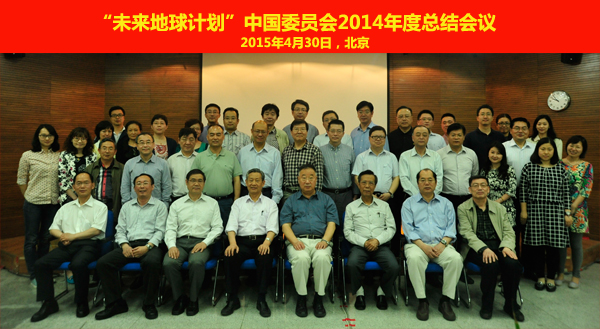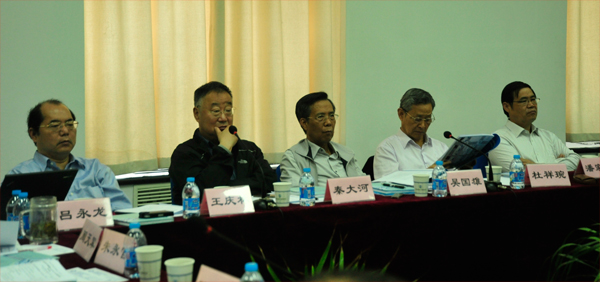Chinese National Committee for Future Earth (CNC-FE) held its 2014 annual meeting at the State Key Laboratory of Numerical Modelling for Atmospheric Sciences and Geophysical Fluid Dynamics (LASG), Institute of Atmospheric Physics (IAP), Chinese Academy of Sciences (CAS) on 30th April 2015. The meeting aimed to review CNC-FE’s work in 2014 and make working plans of CNC-FE in 2015., discuss Post-2015 UN Development Agenda and Sustainable Development Goals, provide advices on the 13th-Five-Year-Plan in China; and absorb representatives from major industry and civil society to expand the committee diversities.
The meeting was hosted by China Association for Science and Technology (CAST). Prof. Dahe Qin, Vice-President of CAST and Chair of CNC-FE chaired the meeting. Vice-Chairs of CNC-FE Prof. Guoxiong Wu, Prof. Xiangwan Du, Prof. Jiahua Pan, Deputy Director-General of Department of International Affairs, CAST, Dr. Qinglin Wang and over 40 experts and committee members attended the meeting.
Prof. Dahe Qin, Dr. Tianjun Zhou, Dr. Jun Chen and Dr. Yongguan Zhu made the presentations on “The Latest Activities of Future Earth”, “Chinese National Committee for Future Earth-formation, structure & plans”, “International Workshop on “Supporting Future Earth with Global Geo-information’” and “Progress of Urban Health and Wellbeing Programme”, respectively. Prof. Guoxiong Wu introduced the “Belmont Forum Collaborative Research Action on ‘Mountains as Sentinels of Change’”.
It was agreed that two new themes, sustainable development of ocean and coastal zone, and Tibetan Plateau and global climate change, should be added to the current 12 CNC-FE Research Priorities (http://cnc-fe.cast.org.cn/eng-index.asp) to address the national demands. Next, CNC-FE may extend its research priorities in the fields of mountainous regions (e.g., impoverished/ ecologically vulnerable areas), political economy of ecological civilization, resources association with international conflict and environmental disaster, etc.
The following key points should be emphasized in the future development for CNC-FE.
1. China is the first country who issued the UN Agenda 21 and brought it into the national development plan. Our overall approach is to accelerate economic, political, cultural, social, and ecological progress. CNC-FE is encouraged to promote modernization featuring harmonious development between man and nature.
2. Water-energy-food nexus security and urban resilience should be stressed in the CNC-FE’s report to the 13th-Five-Year-Plan in China. We must enhance system building to promote ecological civilization by realizing the Chinese-style path of carrying out industrialization, IT application, urbanization, agricultural modernization and green economy.
3. More channels should be considered to increase the proportion of industry and policy makers in CNC-FE.
When Chinese President Jinping Xi visited Central Asia and Southeast Asia in September and October of 2013, he raised the initiative of jointly building the Silk Road Economic Belt and the 21st-Century Maritime Silk Road (hereinafter referred to as the Belt and Road Initiatives), which have attracted close attention from all over the world. “It’s very important to understand this concept and extend it to the CNC-FE Research Priorities”, said Dr. Qinglin Wang. CNC-FE is supposed to offer feasible suggestions of the national level .
Attendees all agreed that the meeting was productive. Except for deploying working plans in 2015, Prof. Dahe Qin emphasized the significance of the strategic vision of “Belt and Road Initiatives” in CNC-FE’s future development. “Eco-climate study accompanied with the economic construction is the basis for our research priorities” summarized by Prof. Qin.


